情态动词六大要素[上学期]
图片预览

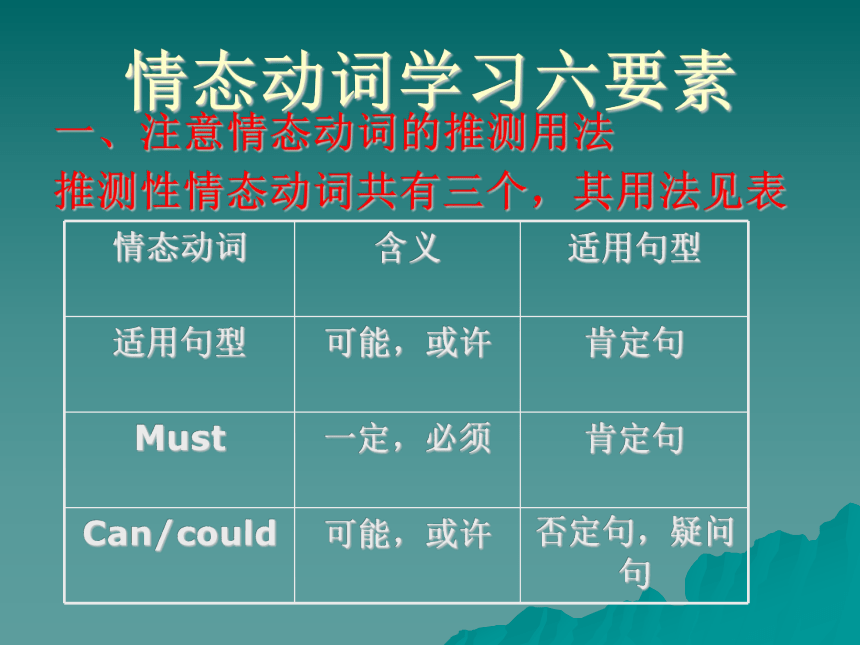
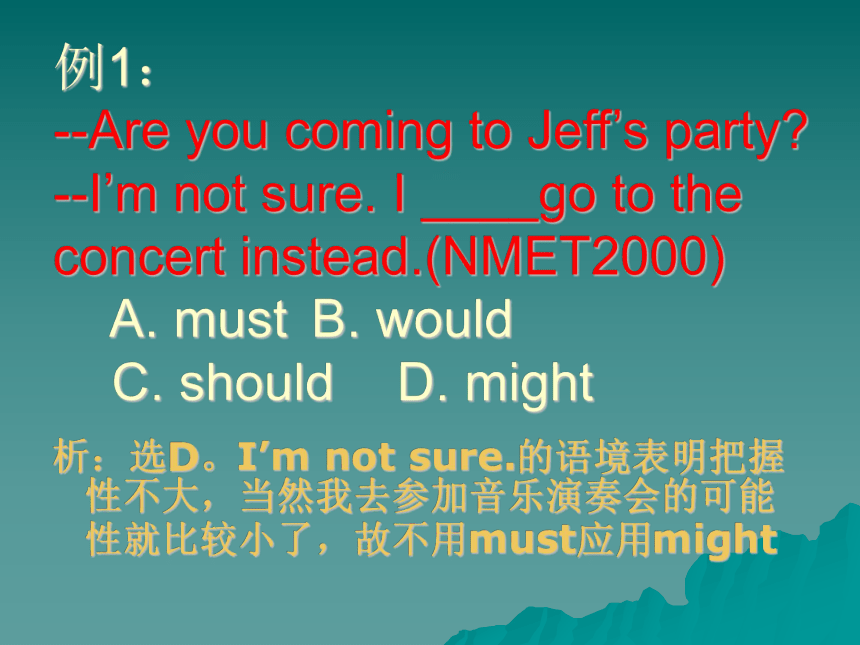



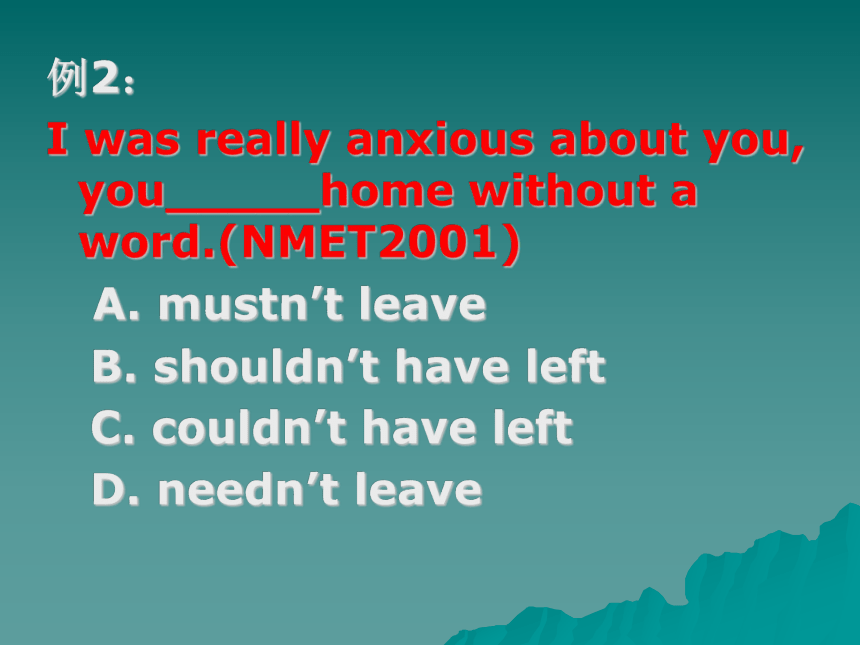

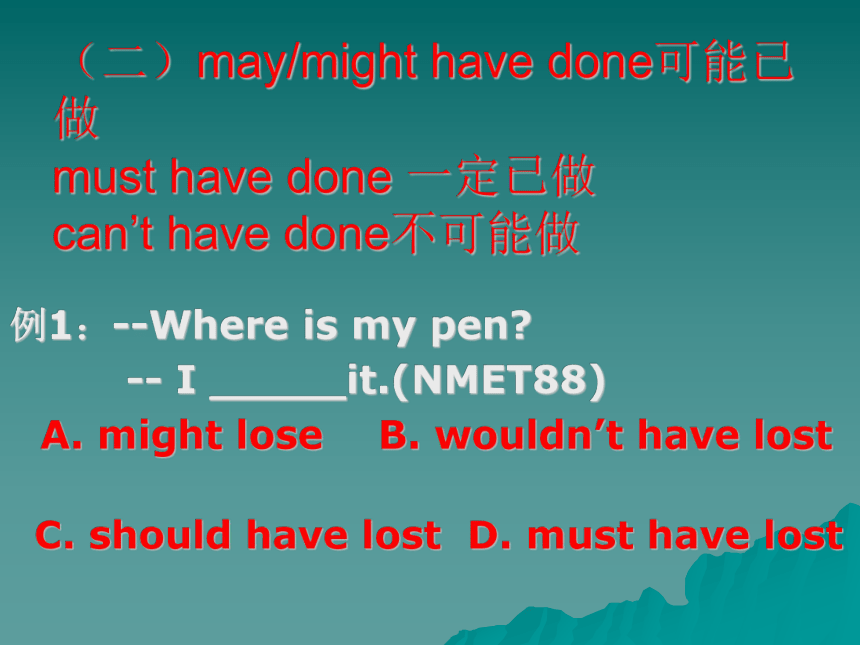
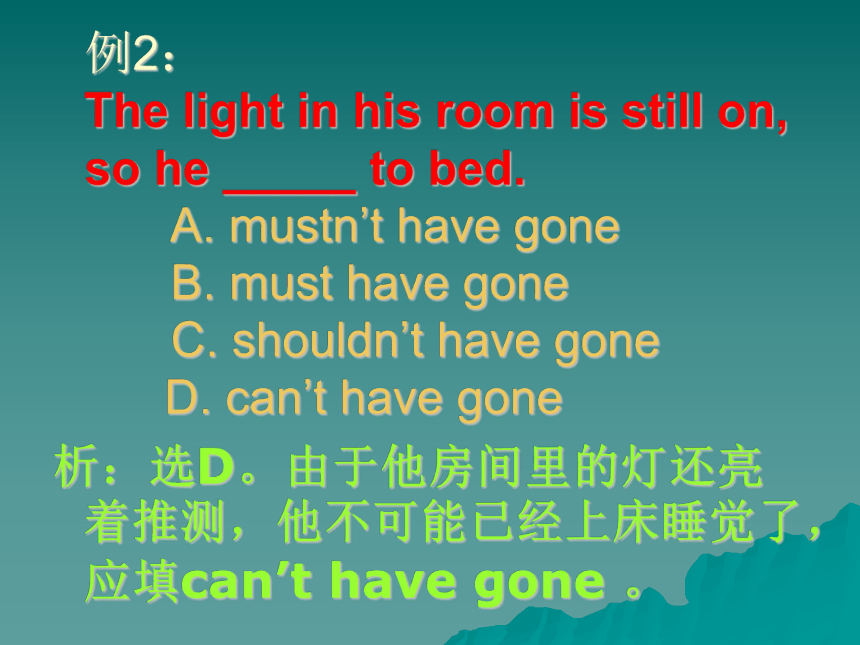

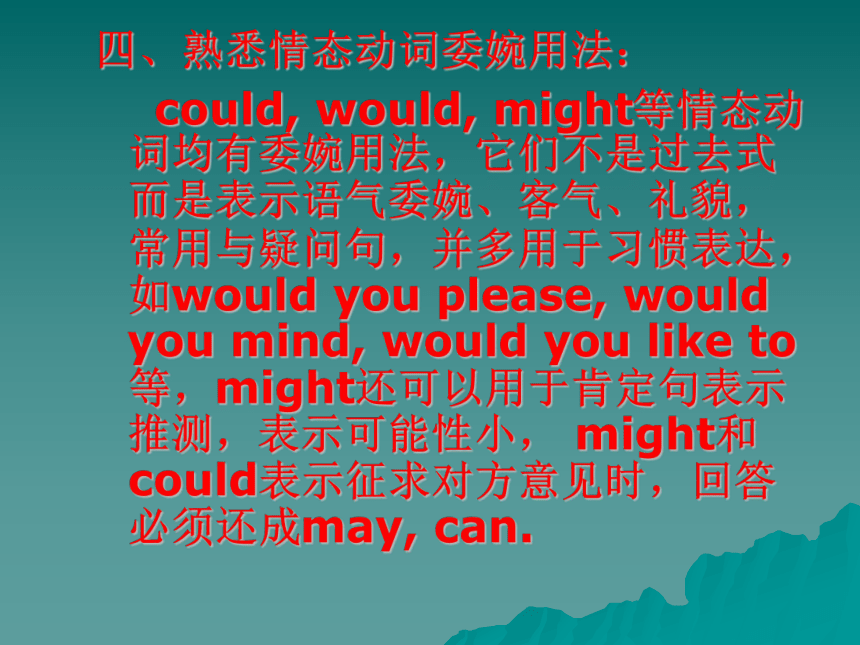
文档简介
课件32张PPT。情态动词学习六要素一、注意情态动词的推测用法
推测性情态动词共有三个,其用法见表 例1: --Are you coming to Jeff’s party? --I’m not sure. I ____go to the concert instead.(NMET2000) A. must B. would C. should D. might析:选D。I’m not sure.的语境表明把握性不大,当然我去参加音乐演奏会的可能性就比较小了,故不用must应用might例 2: --_____the news be true? —No, it_____be true. A. Can, can’t B. May, can’t C. May, may not D. Must, mustn’t析: 选A。因为前半句是疑问句,后半句为否定句,两空都不能使用may/might 和must,应而用can和can’t。二、了解情态动词的完成式用法(一)should /ought to have done本来应做而未做,表达遗憾感彩
例1:I told Sally how to get there,
but perhaps I ____for her.(NMET94)
had to write it out
must have written it out
C. should have written it out
D. ought to write it out析:
选C。分析语境可知,口头上告知Sally如何去那里是不够的,所以我本应书面告知,却有没书面告知之,显得应使用should /ought to have written表示遗憾之情。例2:
I was really anxious about you, you_____home without a word.(NMET2001)
A. mustn’t leave
B. shouldn’t have left
C. couldn’t have left
D. needn’t leave 析: 选B。
由语境可知,我真的为你担心,所以你不应该一句话不说就离开家,但实际上你确实这么做了,显然应填shouldn’t/ought to have left,表示责备。 (二)may/might have done可能已做 must have done 一定已做 can’t have done不可能做例1:--Where is my pen?
-- I _____it.(NMET88)
A. might lose B. wouldn’t have lost
C. should have lost D. must have lost例2: The light in his room is still on, so he _____ to bed. A. mustn’t have gone B. must have gone C. shouldn’t have gone D. can’t have gone析:选D。由于他房间里的灯还亮着推测,他不可能已经上床睡觉了,应填can’t have gone 。(三)could have done指本来能做而实际未做,表达遗憾的感彩 You could at least have sent five cards.你至少可以寄5张明信片的。四、熟悉情态动词委婉用法:
could, would, might等情态动词均有委婉用法,它们不是过去式而是表示语气委婉、客气、礼貌,常用与疑问句,并多用于习惯表达, 如would you please, would you mind, would you like to等,might还可以用于肯定句表示推测,表示可能性小, might和could表示征求对方意见时,回答必须还成may, can.例1:--Could I borrow your dictionary?—Yes, of course you____. A. might B. will C. can D. should析:选C。该句用can的委婉表达式could 来征求对方意见,could 和might通用,但回答时必须还成can或may,因此该题不选A.例2:____you mind my smoking here? A. Should B Could C. Might D. Would析:选D。征求对方意见我是否在这儿吸烟,语气理应委婉,所以应选委婉的表达方式would you mind…来征求对方意见。五、弄清情态动词的异化现象有些情态用于疑问句进行回答时,出现了异化现象,此时回答在某
个角度不能继续使用该情态动词, 而改用别的动词。 例1:--Must I start at once? —No, you____. A. needn’t B. mustn’t C. can’t D. won’t析:A。由语境可知该答句表示“不必”,而mustn’t表示“不准、禁止”,不符合语境,显然应使用needn’t表示“不必”,但肯定句回答继续用must。例2:--Need I hand in my exercise book at once? —Yes, you_____. A. must B. need C. can D. will析:选A。根据规定need用于一般疑问句作肯定回答应换成must,而作否定回答时,使用need的否定式needn’t。六、掌握征求意见情态动词的回答不少情态动词可用于疑问句征求对方意见,但人称上有时有特殊要求,请看下表: 例1:--_____I tell John about it? --No, you needn’t. I have told him already.(NMET94) A. Shall B. Will C. Can D. May析:选A。从回答句“No, you needn’t”的语境可知,问句征求对方意见,表示“需要”而且用语第一人称,要使用shall。例2:_____you please help me with my English? A. Would B. Do C. Shall D. Can析:A。次句表示追求对方意见,有“愿意 ”之意,而且又用于地二人称,应选用would。情态动词1.A left—luggage office is a place where bags ____be left for a short time, especially at a railway station.
A.should B.can C.must D.will2.How ___ you say that you really understand the whole story if you have covered only part of the article?
A.can B.must C.need D.may3.—The room is so dirty._____ we clean it?
--Of course.
A.Will B.Shall C.Would D.DoBAB4.My English-Chinese dictionary has disappeared. Who ___ have taken it?
A.should B.must C.could D.would5.—Is John coming by train?
---He should, but he ____ not. He likes driving his car.
A.must B.can C.need D.may6.—I heard they went skiing in the mountains last winter.
--It ____ true because there was little snow there.
A.may not be B.won’t be
C.could’t be D.mustn’t beCDC7.It has been announced that candidates _____ remain in their seats until all the paper have been collected.
A.can B.will C.may D.shall8.—I hear you’ve got a set of valuable Australian coins.___ I have a look?
--Yes, certainly.
A.Do B.May C.Shall D.Should9.Oh, I’m feeling well in the stomach, I ____ so much fried chicken jusf now.
A.shouldn’t eat B.mustn’t have eaten
C.shouldn’t have eaten D.mustn’t eatDBC10.I was really anxious about you. You ___ home without a word.
A.mustn’t leave B.shouldn’t have left
C.couldn’t have left D.needn’t leave11.You can’t imagine that a well-behaved gentlemen ___ be so rude to a lady.
A.might B.need C.should D.would12.—Write to me when you get home.
--__________.
A.I must B.I should C.I will D.I canBCC13.Mr.Bush is on time for everything. How ___it be that he was late for the opening ceremony?
A.can B.should C.may D.must14.—Are you coming to Jeff’s party?
--I’m not sure. I ___ go to the concert instead.
A.must B.would C.should D.might15.My sister met him at the Grand Theatre yesterday afternoon, so he ___ your lecture.
A.couldn’t have attended B.needn’t have attended
C.mustn’t have attended D.shouldn’t have attendedADA16.Sorry, I’m late. I ____ have turned off the alarm clock and gone back to sleep again.
A.might B.should C.can D.will17.There was a lot of fun at yesterday’s party. You ___ come, but why didn’t you?
A.must have B.should C.need have D.ought to have18.—When can I come for the photes? I need them tomorrow afternoom.
--They ___ be ready by by 12:00.
A.can B.should C.might D.needADB19.—I stayed at a hotel while in New York.
--Oh, did you? You ___ with Barbara.
A.could have stayed B.could stay
C.would stay D.must have stayed20.The fire spread through the hotel very quickly but everyone ____ get out.
A.had to B.would C.was able to D.could21.Jack ___ yet, otherwise he would have telephoned me.
A.mustn’t have arrived B.shouldn’t have arrived
C.can’t have arrived D.needn’t have arrivedA CC22.When he was there, he ___ go to that coffee shop at the corner after work everyday.
A.would B.should C.had better D.might23.Sir, you ___ be sitting in this waiting room. It is for woman and children only.
A.oughtn’t to B.can’t C.won’t D.needn’t24.It’s nearly seven o’clock. Jack ___ be here at any moment.
A.must B.need C.should D.can25. I wonder how he ___ that to the teacher.
A.dare to say B.dare saying C.not dare say D.dared sayAADC26.I told Sally how to get here, but perhaps I ____ for her.
A.had to write it out B.must have written it out
C.should have written it out D.ought to write it out27.Michael ___ be a policeman, for he is much too short.
A.needn’t B.can’t C.should D.mayCBGood-bye
推测性情态动词共有三个,其用法见表 例1: --Are you coming to Jeff’s party? --I’m not sure. I ____go to the concert instead.(NMET2000) A. must B. would C. should D. might析:选D。I’m not sure.的语境表明把握性不大,当然我去参加音乐演奏会的可能性就比较小了,故不用must应用might例 2: --_____the news be true? —No, it_____be true. A. Can, can’t B. May, can’t C. May, may not D. Must, mustn’t析: 选A。因为前半句是疑问句,后半句为否定句,两空都不能使用may/might 和must,应而用can和can’t。二、了解情态动词的完成式用法(一)should /ought to have done本来应做而未做,表达遗憾感彩
例1:I told Sally how to get there,
but perhaps I ____for her.(NMET94)
had to write it out
must have written it out
C. should have written it out
D. ought to write it out析:
选C。分析语境可知,口头上告知Sally如何去那里是不够的,所以我本应书面告知,却有没书面告知之,显得应使用should /ought to have written表示遗憾之情。例2:
I was really anxious about you, you_____home without a word.(NMET2001)
A. mustn’t leave
B. shouldn’t have left
C. couldn’t have left
D. needn’t leave 析: 选B。
由语境可知,我真的为你担心,所以你不应该一句话不说就离开家,但实际上你确实这么做了,显然应填shouldn’t/ought to have left,表示责备。 (二)may/might have done可能已做 must have done 一定已做 can’t have done不可能做例1:--Where is my pen?
-- I _____it.(NMET88)
A. might lose B. wouldn’t have lost
C. should have lost D. must have lost例2: The light in his room is still on, so he _____ to bed. A. mustn’t have gone B. must have gone C. shouldn’t have gone D. can’t have gone析:选D。由于他房间里的灯还亮着推测,他不可能已经上床睡觉了,应填can’t have gone 。(三)could have done指本来能做而实际未做,表达遗憾的感彩 You could at least have sent five cards.你至少可以寄5张明信片的。四、熟悉情态动词委婉用法:
could, would, might等情态动词均有委婉用法,它们不是过去式而是表示语气委婉、客气、礼貌,常用与疑问句,并多用于习惯表达, 如would you please, would you mind, would you like to等,might还可以用于肯定句表示推测,表示可能性小, might和could表示征求对方意见时,回答必须还成may, can.例1:--Could I borrow your dictionary?—Yes, of course you____. A. might B. will C. can D. should析:选C。该句用can的委婉表达式could 来征求对方意见,could 和might通用,但回答时必须还成can或may,因此该题不选A.例2:____you mind my smoking here? A. Should B Could C. Might D. Would析:选D。征求对方意见我是否在这儿吸烟,语气理应委婉,所以应选委婉的表达方式would you mind…来征求对方意见。五、弄清情态动词的异化现象有些情态用于疑问句进行回答时,出现了异化现象,此时回答在某
个角度不能继续使用该情态动词, 而改用别的动词。 例1:--Must I start at once? —No, you____. A. needn’t B. mustn’t C. can’t D. won’t析:A。由语境可知该答句表示“不必”,而mustn’t表示“不准、禁止”,不符合语境,显然应使用needn’t表示“不必”,但肯定句回答继续用must。例2:--Need I hand in my exercise book at once? —Yes, you_____. A. must B. need C. can D. will析:选A。根据规定need用于一般疑问句作肯定回答应换成must,而作否定回答时,使用need的否定式needn’t。六、掌握征求意见情态动词的回答不少情态动词可用于疑问句征求对方意见,但人称上有时有特殊要求,请看下表: 例1:--_____I tell John about it? --No, you needn’t. I have told him already.(NMET94) A. Shall B. Will C. Can D. May析:选A。从回答句“No, you needn’t”的语境可知,问句征求对方意见,表示“需要”而且用语第一人称,要使用shall。例2:_____you please help me with my English? A. Would B. Do C. Shall D. Can析:A。次句表示追求对方意见,有“愿意 ”之意,而且又用于地二人称,应选用would。情态动词1.A left—luggage office is a place where bags ____be left for a short time, especially at a railway station.
A.should B.can C.must D.will2.How ___ you say that you really understand the whole story if you have covered only part of the article?
A.can B.must C.need D.may3.—The room is so dirty._____ we clean it?
--Of course.
A.Will B.Shall C.Would D.DoBAB4.My English-Chinese dictionary has disappeared. Who ___ have taken it?
A.should B.must C.could D.would5.—Is John coming by train?
---He should, but he ____ not. He likes driving his car.
A.must B.can C.need D.may6.—I heard they went skiing in the mountains last winter.
--It ____ true because there was little snow there.
A.may not be B.won’t be
C.could’t be D.mustn’t beCDC7.It has been announced that candidates _____ remain in their seats until all the paper have been collected.
A.can B.will C.may D.shall8.—I hear you’ve got a set of valuable Australian coins.___ I have a look?
--Yes, certainly.
A.Do B.May C.Shall D.Should9.Oh, I’m feeling well in the stomach, I ____ so much fried chicken jusf now.
A.shouldn’t eat B.mustn’t have eaten
C.shouldn’t have eaten D.mustn’t eatDBC10.I was really anxious about you. You ___ home without a word.
A.mustn’t leave B.shouldn’t have left
C.couldn’t have left D.needn’t leave11.You can’t imagine that a well-behaved gentlemen ___ be so rude to a lady.
A.might B.need C.should D.would12.—Write to me when you get home.
--__________.
A.I must B.I should C.I will D.I canBCC13.Mr.Bush is on time for everything. How ___it be that he was late for the opening ceremony?
A.can B.should C.may D.must14.—Are you coming to Jeff’s party?
--I’m not sure. I ___ go to the concert instead.
A.must B.would C.should D.might15.My sister met him at the Grand Theatre yesterday afternoon, so he ___ your lecture.
A.couldn’t have attended B.needn’t have attended
C.mustn’t have attended D.shouldn’t have attendedADA16.Sorry, I’m late. I ____ have turned off the alarm clock and gone back to sleep again.
A.might B.should C.can D.will17.There was a lot of fun at yesterday’s party. You ___ come, but why didn’t you?
A.must have B.should C.need have D.ought to have18.—When can I come for the photes? I need them tomorrow afternoom.
--They ___ be ready by by 12:00.
A.can B.should C.might D.needADB19.—I stayed at a hotel while in New York.
--Oh, did you? You ___ with Barbara.
A.could have stayed B.could stay
C.would stay D.must have stayed20.The fire spread through the hotel very quickly but everyone ____ get out.
A.had to B.would C.was able to D.could21.Jack ___ yet, otherwise he would have telephoned me.
A.mustn’t have arrived B.shouldn’t have arrived
C.can’t have arrived D.needn’t have arrivedA CC22.When he was there, he ___ go to that coffee shop at the corner after work everyday.
A.would B.should C.had better D.might23.Sir, you ___ be sitting in this waiting room. It is for woman and children only.
A.oughtn’t to B.can’t C.won’t D.needn’t24.It’s nearly seven o’clock. Jack ___ be here at any moment.
A.must B.need C.should D.can25. I wonder how he ___ that to the teacher.
A.dare to say B.dare saying C.not dare say D.dared sayAADC26.I told Sally how to get here, but perhaps I ____ for her.
A.had to write it out B.must have written it out
C.should have written it out D.ought to write it out27.Michael ___ be a policeman, for he is much too short.
A.needn’t B.can’t C.should D.mayCBGood-bye
